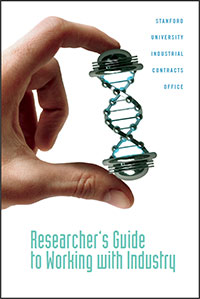Industrial Contracts Office
3000 El Camino Real
Building 5, Suite 300
Palo Alto, CA 94306
ico@stanford.edu
FOR RESEARCH ADMINISTRATORS
If the researchers you support need research materials from outside labs or are planning to receive research funding from industry, the Industrial Contracts Office (ICO) will help with the process. ICO negotiates a variety of research contracts with industry, including sponsored research agreements (SRAs), industry affiliates program agreements, plus lab material transfers (MTAs) with both industry and nonprofit groups.

Are MTAs necessary?
Not always. We are encouraging researchers to share laboratory materials without agreements, when possible.
A MESSAGE TO FACULTY FROM ANN ARVIN, VICE PROVOST AND DEAN OF RESEARCH:
July 12, 2010
Dear Colleagues,
I would like to bring this information about our policies and procedures related to Material Transfer Agreements to your attention.
Stanford encourages the free exchange of information and materials with research colleagues, whether these colleagues are at other academic or non-profit institutions or in industry. The growing practice of using MTAs when non-human, biological material is shared for in vitro research purposes has become a barrier to these interactions. We have worked with our peer institutions to eliminate the use of MTAs whenever possible and to rely instead on the longstanding practice of publicly acknowledging colleagues for materials they have provided in papers and presentations. Accordingly, Stanford does not require or encourage the use of an MTA when you are giving non-human, biological material to be used for in vitro research purposes to your research colleagues. Restrictions to keep materials or research results confidential generally are not appropriate between academic researchers, and are usually not necessary between academic and industry researchers.
If circumstances require an MTA, the Simple Letter Agreement (SLA) or the Uniform Biological Material Transfer Agreement (UBMTA) should be used without changes. The SLA and UBMTA forms are available on the Industrial Contracts Office (ICO) website. In the rare instance that modifications are appropriate, the revisions must be approved by the Industrial Contracts Office.
NOTE: (1) the transfer of human biologic material and specimens and materials for use in humans is governed by separate regulations (please refer to http://humansubjects.stanford.edu and Human Tissue Transfers) and (2) the transfer of any materials funded by the California Institute for Regenerative Medicine (CIRM) is subject to special MTA requirements (Please contact the ICO for instructions).
Please let us know if you have any questions or comments.
~~~~~~~~~~~~~~~
Ann M. Arvin, M.D.
Lucile Salter Packard Professor of Pediatrics and
Professor of Microbiology & Immunology
Stanford University School of Medicine
G-311, 650-498-6227
Vice Provost and Dean of Research
Stanford University
~~~~~~~~~~~~~~~
A number of other universities (PDF) support this MTA policy.
Please note that agreements are required when:
- Sending human tissues.
- Sending or receiving materials under CIRM (California Institute of Regenerative Medicine) funding. MTA for sending CIRM-funded materials to nonprofit organizations. MTA for sending CIRM-funded materials to companies.
- Sending or receiving materials for other projects where an MTA is legally required.
Quick Links to Which Office Will Handle Your Agreements
| CDA | ICO, OSR, OTL |
|---|---|
| Collaboration | ICO |
| Consultant to Stanford | Procurement |
| Consulting by Faculty | Faculty |
| Clinical Trial | CT-RMG |
| Equipment Loan | ICO, Procurement |
| Fellowship | OSR, RMG, Development |
| Gift | Development |
| Grant | OSR, RMG |
| Human Tissue Transfer | ICO |
| Importing/Exporting | Procurement |
| Industrial Affiliate | ICO |
| Intellectual Property Plans | ICO |
| Intergovernmental Personnel | OSR |
| Joint Personnel | OSR |
| License into Stanford | Procurement |
| License from Stanford | OTL |
| Material Transfer | ICO |
| Proposals | OSR, RMG, ERA |
| Purchases | Procurement |
| SBIR/STTR | OSR |
| Shipping | Procurement |
| Software for Research | ICO |
| Software Purchase | Procurement |
| Sponsored Research | ICO, OSR |
| Subaward | OSR |
| Subcontract | OSR |
PDF fold-up reference card:
Who Handles Research-Related Agreements at Stanford
